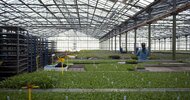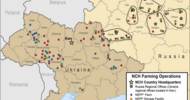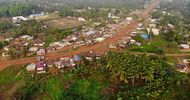About 20 million ha of land have been transferred to investors in recent months, most of it in Africa. Given the scale of the phenomenon, many people are calling for safeguards to protect the interests of local communities.
Will African businessmen one day buy thousands of hectares of rich cereal croplands in the American Midwest or in France's Beauce region to supply the continent's growing needs for wheat and maize? The idea may be laughable, but it could seem slightly less far-fetched in the light of a growing trend for countries and private companies to buy or lease land for cultivation in various parts of the world to satisfy their strategic requirements and ensure food supplies. The phenomenon is becoming increasingly widespread. According to analysts at the International Food Policy Research Institute (IFPRI), it now involves between 15 and 20 million ha, the equivalent of almost the total amount of cultivated land in Germany. The investments behind these land acquisitions are estimated at between €15 and €21 billion.
The practice began in earnest after the food and financial crises struck in 2007 and 2008. These events forced some countries that are highly or totally dependent on food imports to reflect on the risks linked to an increasingly volatile and uncertain global market and the subsequent threat of shortages. They are now seeking to secure food supplies by acquiring land in other countries to feed their people. Major foreign investors include countries whose geoclimatic conditions prevent any agricultural development. Among them are Qatar, Saudi Arabia and the United Arab Emirates. When food prices soared in 2007, these three governments watched anxiously as large numbers of immigrant workers became increasingly angered by the massive hike in rice prices. Other countries - China, India and South Korea - do not have enough land and their growing needs are prompting them to 'delocalise' their agricultural output.
This rush to acquire arable land was also caused by the financial crisis of 2008. New demand created by biofuels in particular, coupled with the growth of urbanisation and restrictions imposed on deforestation, have resulted in land becoming an increasingly rare and sought-after commodity. Faced with poor performances in traditional markets - on stock markets and in raw materials - investors have realised that agricultural land is a sound and viable asset. Since 2008 there has been a sharp upturn in the number of investment funds dealing in land acquisition. In 2008, Emergent Asset Management (EAM), a firm specialising in the emerging markets, joined forces with South African agricultural product dealer, Grainvest, to launch the African Land Fund (ALF) to acquire land in southern Africa.
Wide-scale transfers
The secrecy surrounding these land transactions makes it difficult to find out who has acquired what and where. But recent reports published on the issue give some idea of the extent of the phenomenon, which is mainly concentrated in Africa (Ethiopia, Ghana, Madagascar, Mali, Sudan, Uganda…) but is also spreading to Asia and now Eastern Europe (Ukraine).
Main land acquisitions in Africa
[caption id="attachment_7819" align="aligncenter" width="430" caption="Source: IIED report, June 2009"] [/caption]
Only recently, DR Congo is reported to have transferred 2.8 million ha of land to China for the world's largest palm oil plantation, having previously made available 10 million ha of its land to South Africa. Madagascar hit the headlines in late 2008 with the 'Daewoo affair' - the South Korean company was due to lease 1.3 million ha or half the island's arable land to produce maize and palm oil for the Korean market. The deal sparked a heated debate that spilled beyond the national borders and added to the unpopularity of the former president. One of the first decisions of his successor was to denounce the contract. In Mali, Libyan investment fund Malibya has leased 100,000 ha to grow rice in the Office du Niger region. Previously, Libya obtained 15,000 ha from Liberia, also for rice production.
Governments naturally expect rich rewards for these land transfers, which take the form of very long leases (99 years). The transactions generally (but not always) involve the payment of annual rent or a lump sum when the deal is signed. Investors sometimes pledge to fund infrastructures for the region (roads, irrigation systems, schools and health clinics) and provide agricultural technology transfers. The creation of large modern farms may be a source of local jobs and an engine for development in production sectors.
However, negotiations for these deals spark mistrust and raise questions. The acquisition of land by foreigners may upset local traditions and ways of thinking. Some fear the practice will lead to the creation of vast estates, as in Central and Latin America, managed by multinational companies for whom small-scale farmers, who have been evicted from their land, work as agricultural labourers.
Moreover, as most studies stress, the signing of these deals is rarely transparent: the farmers and communities affected are neither consulted nor involved in the transactions. Producer organisations oppose the idea of these land transfers. "They are selling off African land for a song," said Ndiogou Fall, president of the executive committee for the Network of Peasant Organizations and Producers in West Africa (ROPPA), which is calling for dialogue between governments, producers and African and foreign investors. "Thousands of small-scale producers are being forced into poverty. That is intolerable. Land must remain the heritage of the African community." Victor Mhone of the Civil Society Agriculture Network (CISANET), a grouping of individuals and NGOs in Malawi, said: "What we need as a country is to improve on food production, and that can be done if we empower local farmers by giving them the best land for cultivation."
Tripartite negotiations
In a report published in June 2009, the International Institute for Environment and Development (IIED), which together with FAO and IFAD carried out an inquiry into eight African countries, recommends involving local communities in negotiations and taking their interests more into account. The idea would be to turn the bilateral negotiations between governments and potential buyers into tripartite negotiations that include agricultural representatives from the region. That would avoid the risk of transferring land that is not registered as cultivated but which is nevertheless used by village communities for extensive agricultural activities, as well as for harvesting wild plants, especially medicinal ones, gathering firewood and hunting. Rural communities should also have the power to express their views on the availability of resources, especially water: some major foreign initiatives involve developments that require massive quantities of water, with the risk of reducing availability for local farmers. A case in point is Mali, where Libyan hydro-agricultural installations are planned for the Office du Niger region.
The presence of farmers at negotiations could prove to be effective if they are really able to defend their interests against powerful investors. It is therefore essential that they be grouped into solid organisations that are truly representative and that they be trained to take part in these talks.
Such preparations are especially important since, as the IIED report highlights, many contracts lack transparency and precision, especially regarding the intentions of buyers in terms of investment, sectorial development, jobs and the final destination of output (local markets or export). Even the World Bank, which supports the principle of private investment as a means of increasing food production, calls for a code of conduct to be established. Such a set of rules, says Marilou Uy, sector director for the World Bank's Africa Financial and Private Sector Development Department, should "bring a clear understanding on a wide range of matters from land policy, social development... to governance and transparency." But for any code to be accepted by all parties, it would be crucial that there first be a thorough debate, with free choices made about food security and sovereignty - aspects of agricultural policy to which producer organisations are extremely sensitive.
[/caption]
Only recently, DR Congo is reported to have transferred 2.8 million ha of land to China for the world's largest palm oil plantation, having previously made available 10 million ha of its land to South Africa. Madagascar hit the headlines in late 2008 with the 'Daewoo affair' - the South Korean company was due to lease 1.3 million ha or half the island's arable land to produce maize and palm oil for the Korean market. The deal sparked a heated debate that spilled beyond the national borders and added to the unpopularity of the former president. One of the first decisions of his successor was to denounce the contract. In Mali, Libyan investment fund Malibya has leased 100,000 ha to grow rice in the Office du Niger region. Previously, Libya obtained 15,000 ha from Liberia, also for rice production.
Governments naturally expect rich rewards for these land transfers, which take the form of very long leases (99 years). The transactions generally (but not always) involve the payment of annual rent or a lump sum when the deal is signed. Investors sometimes pledge to fund infrastructures for the region (roads, irrigation systems, schools and health clinics) and provide agricultural technology transfers. The creation of large modern farms may be a source of local jobs and an engine for development in production sectors.
However, negotiations for these deals spark mistrust and raise questions. The acquisition of land by foreigners may upset local traditions and ways of thinking. Some fear the practice will lead to the creation of vast estates, as in Central and Latin America, managed by multinational companies for whom small-scale farmers, who have been evicted from their land, work as agricultural labourers.
Moreover, as most studies stress, the signing of these deals is rarely transparent: the farmers and communities affected are neither consulted nor involved in the transactions. Producer organisations oppose the idea of these land transfers. "They are selling off African land for a song," said Ndiogou Fall, president of the executive committee for the Network of Peasant Organizations and Producers in West Africa (ROPPA), which is calling for dialogue between governments, producers and African and foreign investors. "Thousands of small-scale producers are being forced into poverty. That is intolerable. Land must remain the heritage of the African community." Victor Mhone of the Civil Society Agriculture Network (CISANET), a grouping of individuals and NGOs in Malawi, said: "What we need as a country is to improve on food production, and that can be done if we empower local farmers by giving them the best land for cultivation."
Tripartite negotiations
In a report published in June 2009, the International Institute for Environment and Development (IIED), which together with FAO and IFAD carried out an inquiry into eight African countries, recommends involving local communities in negotiations and taking their interests more into account. The idea would be to turn the bilateral negotiations between governments and potential buyers into tripartite negotiations that include agricultural representatives from the region. That would avoid the risk of transferring land that is not registered as cultivated but which is nevertheless used by village communities for extensive agricultural activities, as well as for harvesting wild plants, especially medicinal ones, gathering firewood and hunting. Rural communities should also have the power to express their views on the availability of resources, especially water: some major foreign initiatives involve developments that require massive quantities of water, with the risk of reducing availability for local farmers. A case in point is Mali, where Libyan hydro-agricultural installations are planned for the Office du Niger region.
The presence of farmers at negotiations could prove to be effective if they are really able to defend their interests against powerful investors. It is therefore essential that they be grouped into solid organisations that are truly representative and that they be trained to take part in these talks.
Such preparations are especially important since, as the IIED report highlights, many contracts lack transparency and precision, especially regarding the intentions of buyers in terms of investment, sectorial development, jobs and the final destination of output (local markets or export). Even the World Bank, which supports the principle of private investment as a means of increasing food production, calls for a code of conduct to be established. Such a set of rules, says Marilou Uy, sector director for the World Bank's Africa Financial and Private Sector Development Department, should "bring a clear understanding on a wide range of matters from land policy, social development... to governance and transparency." But for any code to be accepted by all parties, it would be crucial that there first be a thorough debate, with free choices made about food security and sovereignty - aspects of agricultural policy to which producer organisations are extremely sensitive.














